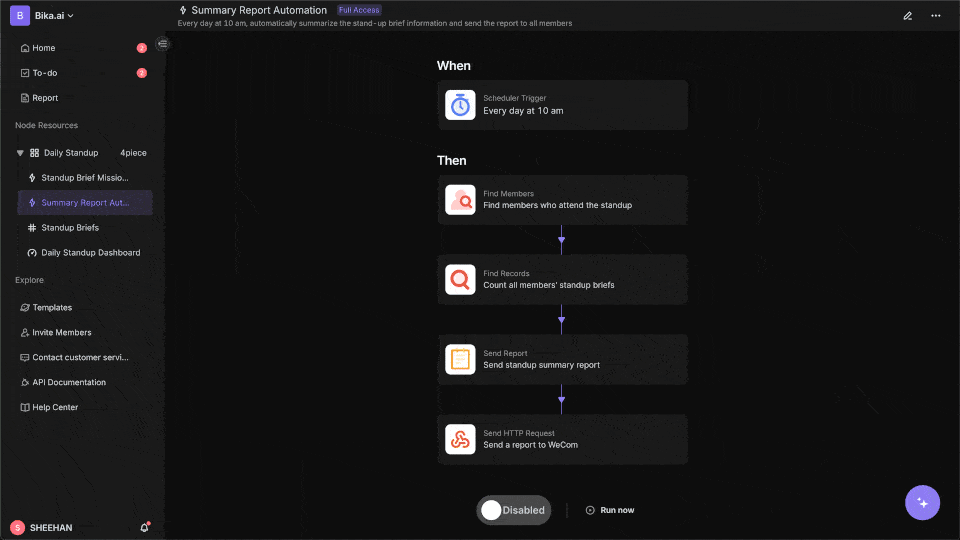
Grow Faster, Work Less: Top Marketing Automation Tools for Startups
Why Marketing Automation is Crucial for Startups in 2025
In 2025, startups are navigating a highly competitive business landscape. With limited budgets and small teams, the need for rapid growth is more pressing than ever. Marketing automation has emerged as a game - changer for these early - stage businesses.
Marketing automation refers to the use of software platforms and technologies to automate repetitive marketing tasks. This includes activities such as email marketing, social media posting, lead nurturing, and customer segmentation. The core purpose is to streamline marketing processes, allowing businesses to focus on more strategic initiatives.
For startups, marketing automation tools offer a plethora of benefits. Firstly, efficiency is significantly enhanced. Startups can automate time - consuming tasks like sending follow - up emails, freeing up valuable time for the marketing team to engage in more creative and high - value activities. Secondly, consistent lead nurturing becomes possible. By setting up automated workflows, startups can ensure that leads are engaged at every stage of the sales funnel, increasing the likelihood of conversion. Thirdly, personalized communication is achievable. Marketing automation tools can analyze customer data to deliver tailored messages, improving customer engagement and loyalty. Fourthly, data - driven decisions are facilitated. These tools provide in - depth analytics, enabling startups to understand their customers better and optimize their marketing strategies accordingly. Finally, scalability is within reach. As startups grow, marketing automation tools can easily adapt to handle increased volumes of leads and customers without a proportional increase in resources.
In essence, marketing automation tools for start - ups are not just a luxury but a necessity in 2025, helping these young businesses to compete effectively in the market.
:::: key-takeaways ::::
- Marketing automation boosts efficiency by automating repetitive tasks, saving time for startups with limited resources.
- It enables consistent lead nurturing, increasing the chances of converting leads into customers.
- Personalized communication through marketing automation improves customer engagement and loyalty. ::::
Top Marketing Automation Tools for Startups
In this section, we present a curated list of leading marketing automation tools suitable for startups. These tools have been selected based on their functionality, cost - effectiveness, and ease of use, making them ideal for early - stage businesses.
Brevo
Brevo is a comprehensive marketing automation platform that offers a wide range of features. It is particularly well - suited for startups looking for an all - in - one solution for their marketing needs.
Core Strengths: Brevo's strength lies in its simplicity and versatility. It provides an intuitive interface that is easy for non - technical users to navigate. This makes it a great choice for startups with limited marketing resources.
Key Features:
- Email Marketing: Brevo offers a robust email marketing suite, allowing startups to create, send, and track highly personalized email campaigns.
- CRM Integration: It seamlessly integrates with popular CRM systems, enabling better lead management and sales - marketing alignment.
- Landing Pages: The platform provides tools to create professional - looking landing pages, which are crucial for lead generation.
- Analytics: Brevo offers detailed analytics, giving startups insights into their campaign performance, such as open rates, click - through rates, and conversion rates.
- Pricing Model: Brevo has a freemium model, which is great for startups on a tight budget. It also offers tiered paid plans with increasing functionality as the business grows.
Pros and Cons:
- Pros: The user - friendly interface and the availability of a free plan make it accessible to startups. The wide range of features in one platform also simplifies marketing operations.
- Cons: Some advanced users may find the customization options a bit limited compared to more enterprise - level solutions.
HubSpot
HubSpot is a well - known name in the marketing automation space. It is suitable for startups that are looking to scale rapidly and need a powerful, feature - rich platform.
Core Strengths: HubSpot's strength is its comprehensive nature. It offers a full - stack of marketing, sales, and customer service tools, all integrated into one ecosystem.
Key Features:
- Email Marketing: HubSpot's email marketing capabilities are top - notch, with advanced segmentation, personalization, and A/B testing features.
- Lead Scoring: It has a built - in lead scoring system, which helps startups prioritize leads based on their likelihood to convert.
- CRM: The HubSpot CRM is highly regarded, providing a 360 - degree view of the customer, from initial contact to post - sale interactions.
- Content Management: The platform includes a content management system, allowing startups to create and publish blog posts, landing pages, and more.
- Analytics: HubSpot offers in - depth analytics across all its tools, enabling data - driven decision - making.
- Pricing Model: HubSpot has tiered pricing plans, starting from a basic plan suitable for small startups to more advanced plans for larger businesses.
Pros and Cons:
- Pros: The integration of multiple tools in one platform provides a seamless experience. The lead scoring and CRM features are particularly useful for startups aiming to grow their sales.
- Cons: The pricing can be relatively high for very early - stage startups, and the platform may have a steeper learning curve compared to some other tools.
Customer.io
Customer.io is a marketing automation tool that focuses on customer - centric messaging. It is ideal for startups that want to deliver highly targeted and relevant messages to their customers.
Core Strengths: Customer.io's strength is its ability to send personalized messages based on customer behavior. It can trigger emails, in - app messages, and push notifications at the right time.
Key Features:
- Behavior - Based Messaging: The platform allows startups to create messages that are triggered by specific customer actions, such as signing up, making a purchase, or abandoning a cart.
- Segmentation: Customer.io offers advanced segmentation capabilities, enabling startups to divide their customer base into distinct groups for more targeted messaging.
- Email and In - App Messaging: It supports both email and in - app messaging, providing multiple channels to reach customers.
- Analytics: The tool provides analytics to measure the effectiveness of messaging campaigns, including engagement rates and conversion metrics.
- Pricing Model: Customer.io has a usage - based pricing model, which can be cost - effective for startups as they only pay for the messages they send.
Pros and Cons:
- Pros: The behavior - based messaging and segmentation features are excellent for delivering personalized experiences. The usage - based pricing is flexible for startups with varying messaging volumes.
- Cons: It may not be the best fit for startups looking for a full - service marketing automation platform with extensive features beyond messaging.
Mailchimp
Mailchimp is a popular marketing automation tool, especially known for its email marketing capabilities. It is a great choice for startups that are primarily focused on building and engaging their email lists.
Core Strengths: Mailchimp's strength is its simplicity and ease of use, especially for email marketing. It has a large library of templates and a user - friendly drag - and - drop editor.
Key Features:
- Email Marketing: Mailchimp offers a wide range of email templates, easy - to - use campaign creation tools, and advanced segmentation options for targeted email sends.
- Automation Workflows: It allows startups to set up automated email workflows, such as welcome series, abandoned cart emails, and anniversary messages.
- E - commerce Integration: Mailchimp has strong e - commerce integration, making it suitable for startups in the online retail space.
- Analytics: The platform provides detailed email - specific analytics, including open rates, click - through rates, and subscriber growth.
- Pricing Model: Mailchimp has a free plan for small lists, and paid plans with additional features as the list size and marketing needs grow.
Pros and Cons:
- Pros: The ease of use and the availability of a free plan make it accessible to startups. The e - commerce integration is a plus for online businesses.
- Cons: Some users may find the advanced features in other platforms more appealing as their marketing needs become more complex.
Essential Features to Look for in Marketing Automation Tools for Your Startup
When choosing marketing automation tools for start - ups, several key features and considerations should be taken into account.
Ease of Use/User Interface: Startups often have limited technical resources. A tool with an intuitive user interface is essential. This allows the marketing team to quickly get up to speed and start using the tool effectively without extensive training.
Pricing/Scalability: Given the budget constraints of startups, pricing is a crucial factor. Look for tools that offer a freemium model or affordable tiered plans. Additionally, the tool should be scalable, meaning it can grow with the startup's marketing needs. As the business expands, the tool should be able to handle more leads, customers, and marketing campaigns without a significant increase in cost.
Core functionalities:
- Email Marketing: Email remains a powerful marketing channel. Ensure the tool has robust email marketing capabilities, including template creation, segmentation, and automation.
- Lead Scoring: A lead scoring system helps prioritize leads, focusing the sales team's efforts on the most promising prospects.
- CRM: Integration with a CRM system is vital for seamless communication between marketing and sales. It allows for better lead management and a more holistic view of the customer.
- Analytics: In - depth analytics are necessary to measure the effectiveness of marketing campaigns. Look for tools that provide detailed data on key metrics such as open rates, click - through rates, and conversion rates.
Integration capabilities: Startups often use a variety of other tools, such as CRM, sales, and website builders. The marketing automation tool should be able to integrate with these existing systems. This ensures a seamless flow of data and enables more efficient marketing operations.
Customer Support & Resources: As startups may be new to marketing automation, having access to good customer support and resources is important. Look for tools that offer comprehensive documentation, tutorials, and responsive customer support teams.
By considering these features, startups can make an informed decision when choosing the ideal marketing automation tools for their business.
Beyond Standalone Tools: Elevating Marketing Automation with Workflow Integration
While marketing automation tools handle specific tasks efficiently, the real power lies in connecting and automating marketing workflows. Platforms like Bika.ai can take marketing automation to the next level by orchestrating complex, cross - platform campaigns.
Bika.ai enables deeper personalization. By integrating data from multiple sources, it can create highly targeted customer journeys. For example, data from the CRM system can be used to trigger personalized email campaigns, ensuring that the right message reaches the right customer at the right time.
Seamless data flow between systems is another major benefit. Bika.ai can bridge the gap between different marketing and sales tools. For instance, it can transfer lead information from the marketing automation tool to the CRM system, and then use that data to automate follow - up actions. This automated customer journey not only improves the customer experience but also increases operational efficiency.
In essence, Bika.ai enhances the capabilities of your chosen marketing automation tools, creating a more intelligent and efficient marketing ecosystem.

Real - World Automation: The Bika.ai Project tracker Template for ``
The Project tracker Template on Bika.ai is a powerful tool for startups looking to streamline their marketing tasks.
💡 Why you should use Project Tracker Template
This template is your ultimate solution for efficient project management. It allows teams to effortlessly manage and track project progress in real - time. For startups, this means better organization and coordination of marketing projects, which is crucial when resources are limited.
👉 How the template works
The template consists of two databases: "Overview" and "Tasks, timelines, and assignees". In the "Overview" database, you can record project details such as name, status, project lead, working team, kickoff date, due date, budget, and links to tasks, timelines, and assignees. The "Tasks, timelines, and assignees" database helps you manage individual tasks, including their status, subtasks, assigned members, project leads, kickoff and due dates, and links back to the corresponding projects.
🎯 How to use
- Open the Project Tracker Template.
- In the "Overview" database, fill in the project details.
- For each project, link to the relevant tasks in the "Tasks, timelines, and assignees" database.
- In the "Tasks, timelines, and assignees" database, manage the tasks by setting their status, subtasks, assigned members, and due dates.
👉 Who should use this template
This template is ideal for project managers, team leads, and anyone involved in project management within a startup. Whether you're working on a small team project or a large - scale enterprise initiative, this template will help you stay organized and on track.
⭐ Key Features of This Template
- Real - time tracking of project progress. This is essential for startups to quickly identify any bottlenecks or delays in their marketing projects.
- Easy assignment of tasks and responsibilities. It ensures that everyone on the team knows what is expected of them, improving team collaboration.
- Clear visualization of project status. This helps in making informed decisions regarding resource allocation and project prioritization.
- Seamless integration of project details and task management. It simplifies the overall project management process, saving time and effort.
🔧 Frequently Asked Questions
- How do I update the project status?
- In the "Overview" database, select the project and update the "Status" field.
- Can I add more tasks to the "Tasks, timelines, and assignees" database?
- Yes, simply create a new record and fill in the task details.
- How do I link a task to a project?
- In the "Tasks, timelines, and assignees" database, use the "Projects" link field to connect it to the corresponding project in the "Overview" database.
For startups, this template can be used to automate lead nurturing. For example, different tasks related to lead follow - up can be assigned and tracked, ensuring that no lead falls through the cracks. In terms of customer engagement, projects related to customer onboarding or loyalty programs can be managed more effectively. It enhances the value of any marketing automation tools for start - ups by making them part of a more intelligent, automated system.
Try the Project tracker Template
Conclusion: Powering Your Startup's Growth with Smart Automation
Marketing automation tools have the transformative power to revolutionize the way startups approach marketing. By automating repetitive tasks, enabling personalized communication, and providing data - driven insights, these tools are essential for startups aiming to grow in 2025.
Choosing the right marketing automation tools is the first step. However, to truly maximize their impact, integration and automation platforms like Bika.ai play a crucial role. Bika.ai not only enhances the capabilities of these tools but also enables the creation of more complex and effective marketing workflows.
We encourage you to explore Bika.ai to build custom automations and achieve unprecedented marketing efficiency for your startup.

FAQ
Q: How can marketing automation tools help startups with limited budgets? A: Marketing automation tools can boost efficiency by automating repetitive tasks, reducing the need for additional staff. Some tools also offer freemium models or affordable tiered plans, making them accessible to startups on a tight budget.
Q: Why is integration important when choosing marketing automation tools for startups? A: Startups often use multiple tools. Integration ensures seamless data flow between different systems, such as CRM, sales, and website builders. This enables more efficient marketing operations and a more holistic view of the customer.
Q: How does the Bika.ai Project tracker template enhance marketing automation for startups?
A: The Project tracker template helps startups manage marketing projects more efficiently. It enables real - time tracking, easy task assignment, and clear visualization of project status. This, in turn, helps in automating lead nurturing and enhancing customer engagement, making the existing marketing automation tools more effective.

Recommend Reading
- Choosing the Right AI Content Detector: A 2025 Comparison Guide
- Choosing the Right AI Content Detector in 2025: A Comprehensive Review
- Elevate Your Presentations: Best Presentation Software Alternatives to PowerPoint in 2025
- Elevate Your Presentations: Best Presentation Software Alternatives to PowerPoint in 2025
- Choosing the Right AI Content Detector: A 2025 Comparison Guide
Recommend AI Automation Templates


Coming soon







